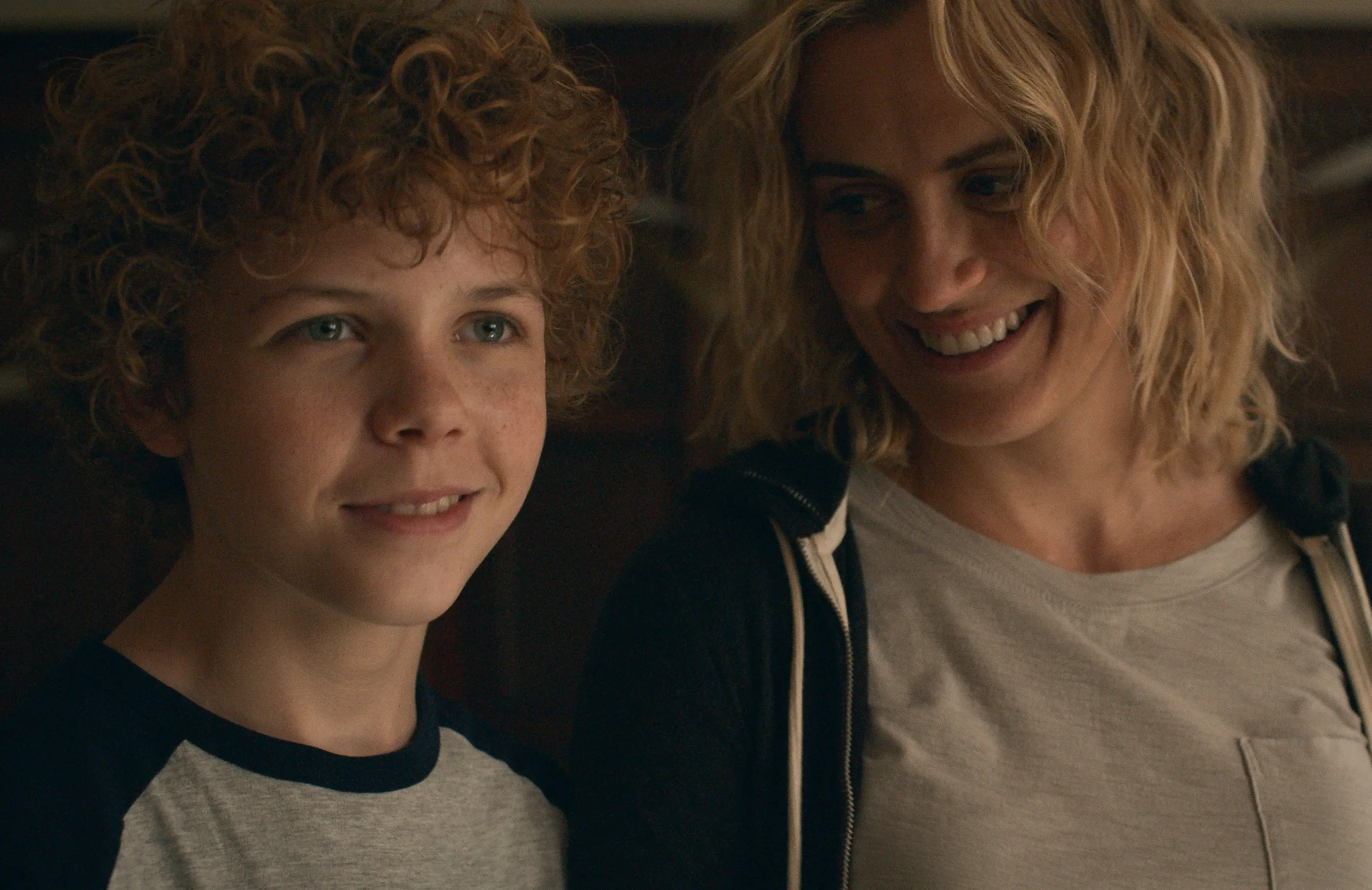Jason Katims Reveals the Connection Between Dear Edward and My So-Called Life
-
 Colin O'Brien and Taylor Schilling in Dear Edward (Photo: Apple TV+)
Colin O'Brien and Taylor Schilling in Dear Edward (Photo: Apple TV+)[Editor's Note: This post contains a mild spoiler for Dear Edward Season 1, Episode 4.]
Apple TV+’s Dear Edward isn’t just an excellent drama. It’s also literally a “must-watch” series, meaning that if audiences look away from the screen for too long, they’ll miss something crucial. Though there’s plenty of dialogue, every episode has several scenes that play out in silence, sometimes without even music on the soundtrack. And in some ways, the lack of words heightens the impact, because the show trusts viewers to hear what’s unspoken.
When we first meet Dee Dee (Connie Britton), she’s practically barricaded behind a wall of words. Whether she’s reminding her college-aged daughter Zoe (Audrey Corsa) how much they both love their traditional birthday lunch or giving their waiter a family history along with the wine order, she spins out speeches to assure herself she’s got everything she wants.
But at the end of the first episode, her husband dies in a plane crash that also kills people tied to the other major characters. The aftermath forces all of them to reevaluate their lives, and for Dee Dee, that means facing her husband’s secrets. She tries to talk her way past them at first, declaring to anyone who will listen that what she’s discovered can’t possibly be true. But the truth is the truth. When she finally accepts it later in the season, she doesn’t say a thing. Instead, she gets up from her dining room table and does something that's both incredibly cathartic and shockingly funny. It reveals something that’s been hiding beneath her monologues.
Series creator Jason Katims cherishes scenes like these. Speaking to Primetimer, he says, “I really believe in the power of visual storytelling. As a writer, I always say, ‘The fewer words, the better. If we can do this with no words, let's do it.’ I love having a show that really allows those silent moments to happen.”
In fact, the season is practically defined by the times that Edward (Colin O’Brien) doesn’t speak. He’s a 12-year-old boy and the only survivor of the plane crash. He loses his parents and his brother, which would make anyone withdraw, and in flashbacks, the series shows that Edward was always introspective and watchful. He’s so smart and so sensitive that sometimes he’s made mute by his feelings, and besides, he’s just a kid, who doesn’t always know how to express himself. At the same time, Edward’s an incredibly rich character. Shortly after the crash, for instance, he pulls his brother’s winter coat out of a cardboard box where his aunt Lacey (Taylor Schilling) has packed his family’s belongings. He doesn’t say anything, but he doesn’t have to. The way he looks at the coat — the way he studies it — communicates exactly what this old piece of clothing means to him now. When he wears it to school, sweating and overheating but refusing to take it off, he doesn’t need a speech about how it’s keeping his brother close to him. It’s obvious to anyone who looks.
That’s just one of many silent scenes that make Edward such an uncommonly soulful kid on television. O’Brien’s astonishing performance is essential to this, and so is the show’s willingness to let Edward endure so much. Katims never doubted the character could handle it. “My first gig as a writer was on My So-Called Life,” he says. “I learned from Winnie Holtzman [who created that show]. The main thing that I learned from her is ‘don’t write down to these characters who are teenagers or younger than teenagers.’ You have to give them dignity and respect, and approach them the way you would approach any character. You lose yourself in them; you find yourself in them. Just the way an actor needs to find themselves in the character, you need to do that as a writer. I tried to treat Edward with an enormous amount of respect and maturity.” Because of that, viewers of any age are likely to respond to his grief, his growth, and his wordless depths.
The first three episodes of Dear Edward are now streaming on Apple TV+. New episodes Fridays through March 24. Join the discussion about the show in our forums.
Mark Blankenship has been writing about arts and culture for twenty years, with bylines in The New York Times, Variety, Vulture, Fortune, and many others. You can hear him on the pop music podcast Mark and Sarah Talk About Songs.
TOPICS: Dear Edward, My So-Called Life, Colin O'Brien, Connie Britton, Jason Katims, Taylor Schilling, Winnie Holzman